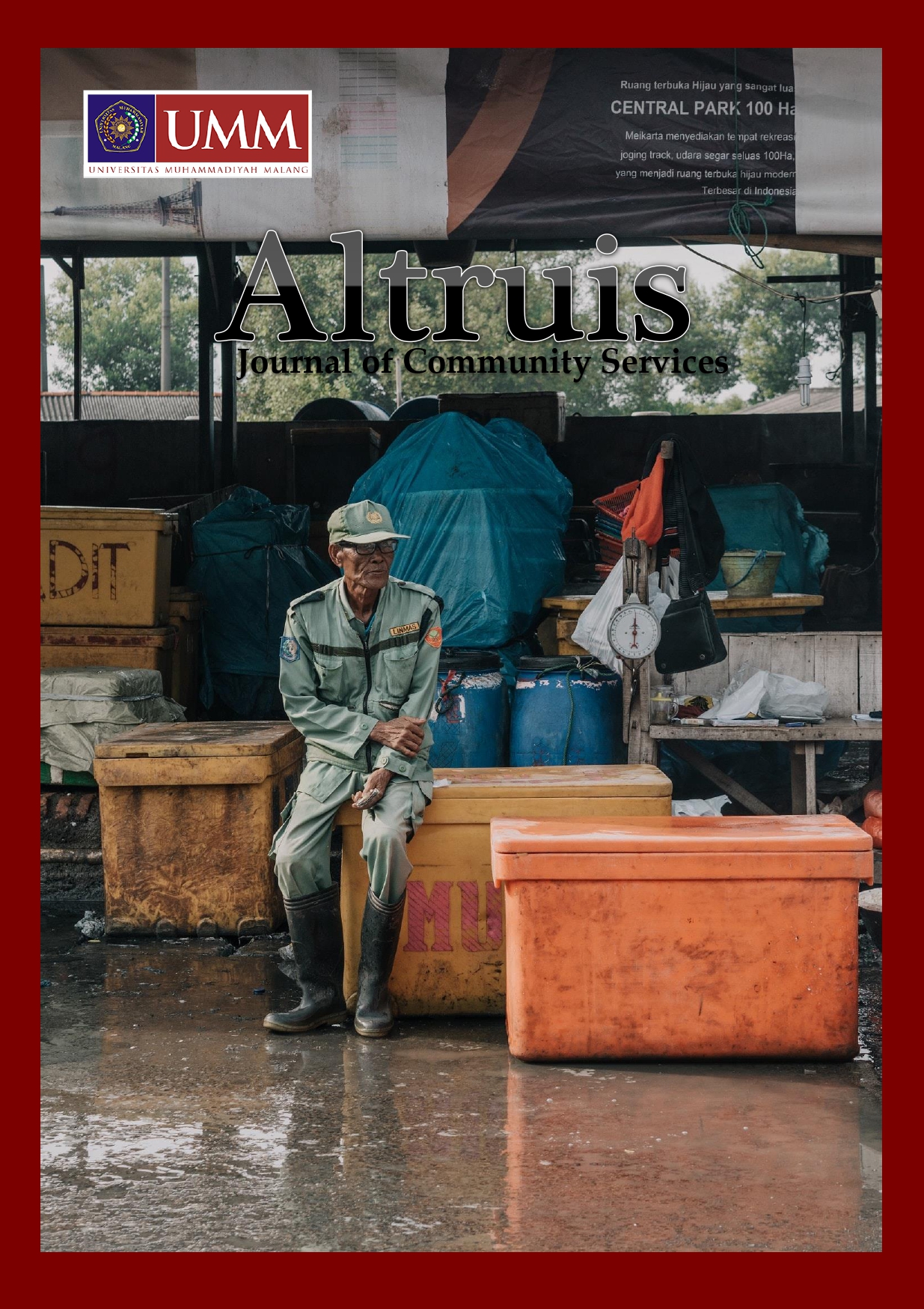Edukasi Peduli Sampah Sedari Dini untuk Anak-Anak Pulau Lengkang, Kota Batam
DOI:
https://doi.org/10.22219/altruis.v1i2.12104Abstract
Pulau Lengkang merupakan salah satu pulau terluar Indonesia yang berada pada perbatasan Indonesia-Singapura. Kondisi eksisting pengelolaan sampah di Pulau Lengkang cukup buruk karena tidak adanya fasilitas pengelolaan sampah yang layak. Selain permasalahan fasilitas pengeloaan sampah di darat sampah, sampah yang mengapung dilaut menjadi salah satu ancaman dampak lingkungan. Meningkatkan kepedulian masyarakat harus dimulai sejak dini khususnya untuk anak-anak. Kegiatan penyuluhan pengelolan sampah di Pulau Lengkang dilakukan dengan sasaran anak-anak kelas satu sampah kelas enam sekolah dasar. Anak-anak sekolah dasar ini dibekali mengenai dampak lingkungan yang mungkin terjadi dari pengelolaan sampah yang buruk melalui storytelling. Selain penyuluhan anak-anak sekolah dasar ini diberikan praktik pemilihan sampah yang dikemas dengan permainan yang menarik.
Downloads
References
Adicita, Y., Suryawan, I. W. K., & Apritama, M. R. (2020). Design of Centralized Wastewater Sewerage System in Small Lengkang Island, Batam City, Indonesia. Journal of Community Based Environmental Engineering and Management, 4(1), 15-24. http://dx.doi.org/10.23969/jcbeem.v4i1.2250
Alkaaf, F. (2017). Perspectives of learners and teachers on implementing the storytelling strategy as a way to develop story writing skills among middle school students. Cogent Education, 4(1), 1348315.
Desa, A., Kadir, N. B. Y. A., & Yusooff, F. (2012). Waste education and awareness strategy: towards solid waste management (SWM) program at UKM. Procedia-Social and Behavioral Sciences, 59, 47-50. https://doi.org/10.1016/j.sbspro.2012.09.244
Dholina Inang, P., Ragil, K., & Mustofa, A. (2015). Edukasi Anak Usia Dini: “Pengenalan dan Pengelolaan Sampah Sebagai Pembentuk Karakter Bangsa”. In Prosiding Seminar Nasional" Pemanfaatan IPTEKS dalam Membangun Ketahanan Pangan (Vol. 1, pp. 237-244). Lembaga Pengabdian Masyarakat UAD.
Sudiatmika, I. D. P. A., Cahyawan, A. K. A., & Buana, P. W. (2014). Aplikasi Game Edukasi Trash Grabber Untuk Mengenal Jenis-Jenis Sampah Pada Smartphone Berbasis Android. Jurnal Ilmiah Merpati (Menara Penelitian Akademika Teknologi Informasi).
Suryawan, I. W. K., & Sofiyah, E. S. (2020). Cultivation of Chlorella Sp. and Algae Mix for NH3-N and PO4-P Domestic Wastewater Removal. Civil and Environmental Science Journal, 3(1). https://doi.org/10.21776/ub.civense.2020.00301.4
Maddox, P., Doran, C., Williams, I. D., & Kus, M. (2011). The role of intergenerational influence in waste education programmes: The THAW project. Waste Management, 31(12), 2590-2600. https://doi.org/10.1016/j.wasman.2011.07.023
Naria, E., & Hasan, W. (2015). Hubungan Kualitas Mikrobiologis Air Sumur Gali dan Pengelolaan Sampah di Rumah Tangga dengan Kejadian Diare pada Keluarga di Kelurahan Terjun Kecamatan Medan Marelan Tahun 2013. Lingkungan dan Kesehatan Kerja, 3(1).
Ponisri, P., Syam, M. I., & Susena, P. R. (2019). Penanggulangan Dan Pengelolaan Sampah Di Lingkungan Sekolah. Abdimas: Papua Journal of Community Service, 1(1), 13-20. https://doi.org/10.33506/pjcs.v1i1.346.
Rahmawan, D. (2019). Perancangan Ruang Kabin Kendaraan Edukasi Lingkungan Mengenai Sampah di Taman Lalu Lintas Ade Irma Suryani Nasution. eProceedings of Art & Design, 6(2).
Ramdhani, S., Yuliastri, N. A., Sari, S. D., & Hasriah, S. (2019). Penanaman Nilai-Nilai Karakter melalui Kegiatan Storytelling dengan Menggunakan Cerita Rakyat Sasak pada Anak Usia Dini. Jurnal Obsesi: Jurnal Pendidikan Anak Usia Dini, 3(1), 153-160. https://doi.org/10.31004/obsesi.v3i1.108
Yodi., Suryawan, I. W. K., & Afifah, A. S. (2020, January). Estimation of Green House Gas (GHG) emission at Telaga Punggur landfill using triangular, LandGEM, and IPCC methods. In Journal of Physics: Conference Series (Vol. 1456, No. 1, p. 012001). IOP Publishing.
Downloads
Published
How to Cite
Issue
Section
License
Authors who publish in Altruis agree to the following terms:
- For all articles published in Altruis, copyright is retained by the authors. Authors give permission to the publisher to announce the work with conditions. When the manuscript is accepted for publication, the authors agree to automatic transfer of the publishing right to the publisher.
- Authors retain copyright and grant the journal right of first publication with the work simultaneously licensed under a Creative Commons Attribution-ShareAlike 4.0 International License that allows others to share the work with an acknowledgment of the work's authorship and initial publication in this journal.
- Authors are able to enter into separate, additional contractual arrangements for the non-exclusive distribution of the journal's published version of the work (e.g., post it to an institutional repository or publish it in a book), with an acknowledgment of its initial publication in this journal.
- Authors are permitted and encouraged to post their work online (e.g., in institutional repositories or on their website) prior to and during the submission process, as it can lead to productive exchanges, as well as earlier and greater citation of published work (See The Effect of Open Access).
This work is licensed under a Creative Commons Attribution-ShareAlike 4.0 International License.


